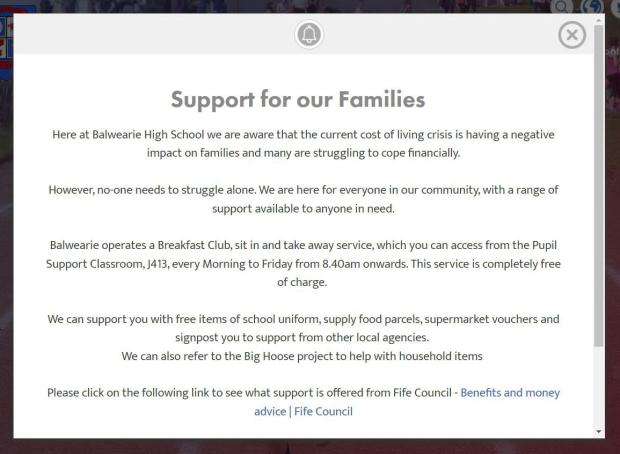In this case study you'll find out how:
- Brunstane Primary School in Edinburgh takes a transparent, open approach to offering support to remove stigma.
- Balwearie High School in Fife encourages families to let them know when there are problems by sending out emails and placing message on their website for parents.
- Beith Primary School in North Ayrshire ensures that parents and carers can access support confidentially.
- Kirkintilloch High School in East Dunbartonshire makes very clear statements on it's written communication offering support.
- Biggar High School in South Lanarkshire shares a statement with families which outlines the school's ethos.
Open and clear communication about support
Brunstane Primary School, Edinburgh
The Depute Head Teacher at Brunstane Primary School in Edinburgh believes that being transparent about help available to families to reduce costs helps parents develop trust in the school.
“When attempts to reduce school costs were first introduced to parents the ideas around this were new, but now that parents have seen the various ways in which we seek to help, like the uniform bank, the grab and go food for instance."
"And what we do is out in the open and we are matter of fact about that, parents can see that the school isn’t making a judgement about them. Parents can get help and it isn’t painful to get help and there is no judgement.”
The benefits of this work are that the children are now more included and have the same opportunities in school. The school is seen by parents as an ally that does not seek to judge and that they don’t have to be suspicious about. School staff are keen to get more parents involved to generate ideas, so that families have ownership and get involved in activities like the breakfast club or filling in application forms. Staff feel that it's important to make sure that activities are done with parents and not done to them, acknowledging in particular that everyone's experience can be very different.
Picking up on problems
Balwearie High School, Fife
Often children and families don’t want to let anyone know that they might be struggling for money, so offering support can depend on someone noticing that there’s an issue in the first place.
Margaret Johnston, Support Services Coordinator at Balwearie High School, Fife, describes how sometimes those young people who are having a particularly difficult time can be invisible. While staff know that there will be young people whose families are struggling in each classroom, they aren't coming to anyone's attention.

To encourage families to let them know when there are problems, the school sends out emails and has placed messages in prominent positions on their website for parents. The school’s teaching staff have an important role to play too. Margaret attends Guidance and Pupil Support department meetings to remind everyone that the service is there to help families, and what they might look out for.
“That’s really increased our footfall I think, through the door, in the last 6 months. That and I think teachers are more willing to speak up and let us know when they think a pupil may need some help.”
Offering non-stigmatising support
Beith Primary School, North Ayrshire
Offering help to families can feel difficult, and schools and nurseries often have to consider how this can be done in a way that works for the families living in their community.
Head Teacher at Beith Primary, Fiona Dunlop:
“Because obviously it’s about dignity as well, and respect. During the pandemic lockdowns the staff went out into the community to deliver food and devices that children needed for home learning. So they made a lot of connections with the local community and the families at that point that we are trying to build on now."
"We’re using that information and that trust to be able to continue to support them in a way that’s not embarrassing for them. We use that knowledge to inform. So things like this year we have set up a uniform shop at Beith. We got grants from Tesco and various other places. We’ve applied for any funding we can get. We call that a swap shop but it doesn’t have to be.”
The school makes sure that parents can access this resource in a confidential and non-stigmatising way. Parents can let the school know what they might need on a confidential form which the school sends out a link to and is also easily accessible on their website. The school then parcels up whatever is needed and sends it home with the child. When thinking about how to offer help, Fiona feels it’s worth remembering that no two families are the same.
“People need different things at different times, and I think that was really important that you’re aware of that. It’s really about intelligence and attitude I think, you’ve got to have that, you have to work hard to build trust. People are proud and we try to do it in a way that keeps allows people to save face if you like, so they don’t feel as if they’re being identified in the wrong way.”
Don't let cost be a barrier
Kirkintilloch High School, East Dunbartonshire
At Kirkintilloch High School, staff have found that being upfront about the help they offer pays off. Head Teacher Maureen Daniel describes how the school approaches this.
“It's about overt statements. For a school trip one of the first things we would say in messages is: ‘If you would like your child to participate but you are in any way concerned about the cost, please don’t be. Just give me a call or call the child’s guidance teacher.’ So straight away what you are saying is don’t let cost be a barrier.”

Communicating in this way has helped parents to come forward, some of whom the school has been able to offer further support to in the form of referrals to Citizens Advice and the Money Talks service. Key to this is setting the right tone in messages, keeping it clear and consistent and repeating the offer of support regularly.
Communicating commitment to equity
Biggar High School, South Lanarkshire
An effective and direct way to show a commitment to equity is to share a statement with parents and carers outlining the school’s ethos.
At the start of each session, Biggar High sends a policy statement to all parents and carers which describes why the school takes the issue of poverty seriously and the action it is taking.
The statement includes:
- A clear message about the school’s commitment to equity.
- Details about the specific areas in which the school offers support.
- A list of the members of staff who can be contacted and contact details.
- Information about Pupil Equity Funding and the school’s own Equity Fund
Head Teacher, Robert Stewart says that:
“The aim of our school is 'to enable every member of our school community to achieve their full potential' and to achieve this end we have a moral duty to ensure that, wherever we can, work as a school community to eliminate any barriers to pupil learning and progress. To this end we endeavour, in a variety of ways, to alleviate the cost of the school day for pupils and families who may require financial support.”
Other ideas you might like
Our Talking about costs and money at school resource offers lots of great advice for communicating well with parents and carers.